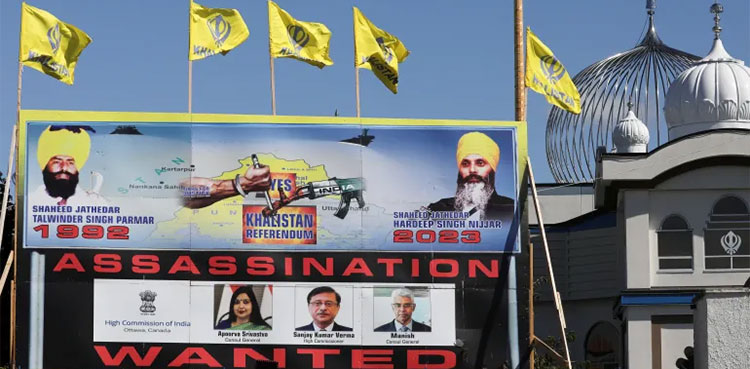NEW YORK: American spy agencies gave assistance, but communications intercepted by Canada were more definitive in linking India to the killing of Sikh separatist leader Hardeep Singh Nijjar that has heightened tensions between the two countries, The New York Times reported Sunday.
Quoting Western allied officials, the leading American newspaper said U.S. intelligence agencies offered their Canadian counterparts context that helped Canada conclude that India had been involved. Yet, it said, what appears to be the “smoking gun,” intercepted communications of Indian diplomats in Canada indicating involvement in the plot.
While US Secretary of State Antony Blinken has called on India to cooperate with the Canadian investigation, American officials have largely tried to avoid triggering any diplomatic blowback from India, it was pointed out.
Related: US concerned at Canada allegations of Hardeep Singh Nijjar murder
But the disclosure of the involvement of U.S. intelligence risks ensnaring Washington in the diplomatic battle between Canada and India at a time when it is keen to develop New Delhi as a closer partner, the report said.
The United States did not learn about the plot, or evidence pointing to India’s involvement in it, until after operatives had killed the Sikh leader, Nijjar, the Times said, quoting allied officials.
Two men fatally shot Nijjar, a Canadian citizen who had advocated independence for the Indian Punjab, in the Vancouver area on June 18.
In New York, Pakistan said it was not “surprised” by Canada’s revelations that the Indian government was involved in the murder of the pro-Khalistan leader.
Related: Hardeep Singh Nijjar: Who was the Sikh leader murdered in Canada?
Pakistan’s caretaker Prime Minister Anwaar-ul-Haq Kakar linked the episode to Indian Prime Minister Narendra Modi’s ideology of Hindu nationalism, or Hindutva. “These ideologues of Hindutva, they are becoming emboldened in a manner that they are now going beyond the region,” Kakar said at the Council on Foreign Relations in New York as he took part in the UN General Assembly.
The “unfortunate killing of Mr. Singh on Canadian soil is a reflection of that ominous tendency,” he said. In Islamabad, Foreign Office Spokesperson Mumtaz Zehra Baloch called the incident “a reckless and irresponsible act that calls into question India’s reliability as a credible international partner and its claims for enhanced global responsibilities.”
It shows “that India’s network of extra-territorial killings has now gone global,” she added. Before the killing, the Times said, Canadian officials had told Nijjar that he was in danger.
Several friends and associates of Nijjar said that he had been warned repeatedly about threats against him and had been cautioned to avoid the temple.
After his death, U.S. officials told their Canadian counterparts that Washington had not had any advance information about the plot, and that if U.S. officials had they would have immediately informed Ottawa under the intelligence agencies’ “duty to warn” doctrine, according to two allied officials.
The officials, who spoke on the condition of anonymity to discuss what has become a diplomatic firestorm, said Canadian officials had offered a general warning to Nijjar but had not told him that he was the target of an Indian government plot.
The United States routinely, and automatically, shares huge amounts of intercepted communications with its closest intelligence partners, including Canada, the report said.
But the contextual information about the killing was shared deliberately as part of a package of various intelligence streams.
A spokesperson for the White House declined to comment. U.S. officials were reluctant to discuss the killing because although Washington wants to assist Canada, a close ally, it does not want to alienate India, a partner with which it is hoping to expand ties as a counterbalance to China’s rising influence in Asia, according to the Times.
The accusation has created a diplomatic rift between Ottawa and New Delhi, leading each to expel the other’s intelligence officers and India to suspend visas for Canadians. Nevertheless, the killing, and the alleged involvement of the Indian government, has shocked officials in Washington, the report said.
Prime Minister Justin Trudeau and Canadian officials have declined to release the specifics of the intelligence Canada has gathered about India.
Canadian officials say it is important not to compromise the Royal Canadian Mounted Police’s investigation of the killing. Allied officials, according to the Times, would not describe in detail the intelligence shared by the United States.
A Canadian government official, who spoke on the condition of anonymity to discuss sensitive information, said the government had received intelligence from multiple countries, the report said.
The Canadian Broadcasting Corp earlier reported that the Canadian government had gathered communications of Indian diplomats in Canada.



Leave a Comment